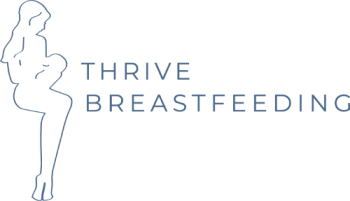If you plan on breastfeeding after pregnancy, you’ll most likely have questions about your breast milk. Some moms, especially the new ones, don’t realize that their breasts make the perfect amount of milk for their baby.
Your body has been hard at work producing early milk, or colostrum, during pregnancy. In two to five days after birth, the mature milk starts to come in and establish a healthy milk supply for your newborn.
The Early Milk (Colostrum)
You might be wondering if there is milk at birth. The answer is yes. Milk starts forming at 16 to 22 weeks of pregnancy. This early milk is highly concentrated with immune antibodies and nutrients vital for newborns.
Because colostrum has everything a baby needs and is nutrient-packed, a small amount of colostrum is enough for your baby’s tiny stomach. Therefore, in the first 24 – 48 hours of life, two to ten ml of colostrum at each feeding is a perfect-sized meal. After two to three days, your supply increases to 30 to 60ml per feeding.
So, When Will My Milk Come In?
The rate at which breasts produce milk varies in all women. For instance, some women leak colostrum during pregnancy and right after birth; For some, it takes a little time for breast milk to come in. Both groups of women produce the optimal food (breast milk!) for the baby’s health. You’ll notice a difference in color and consistency when comparing colostrum to mature milk.
when does breast milk come in
Many moms notice signs milk is coming in during pregnancy, even the new moms. Some common symptoms include:
- Engorged breasts feel full, firm, and heavy
- Breast swelling
- Breast milk leaks at night
- Milk supply increases
- Nipples flatten
- Tightening of the skin framing the areolas
Fortunately, breast engorgement and discomfort are only in the early days of postpartum. Sometimes the breasts are engorged even after the mature milk arrives. So, that means either your body is producing more milk than needed, or you aren’t breastfeeding often enough to drain your breasts.
Sometimes a baby has difficulty fully emptying your breasts. In such cases, it is recommended to opt for pumping. Similarly to a baby, pumping expresses breast milk from the breasts in order to store milk in storage bags. Breast milk is good for up to 5 days in the refrigerator and up to 5 months in the freezer.
How Can I Manage Breast Engorgement
Breast engorgement is part of the breastfeeding cycle. Having to live with swollen and hard breasts can be uncomfortable.
The good news is that you can get rid of the discomfort and pain by trying these simple strategies:
- Bring baby to breast every two to three hours
- Pump or hand express to help relieve engorgement
- Warm compress – using warm compresses stimulates letdown
- Massaging also eases the pain and helps milk flow
- Go green – placing fresh cabbage leaves reduces discomfort
When you are not breastfeeding frequently, try:
- Hand expression to relieve breast engorgement
- Easing discomfort – cabbage leaves, frozen vegetables, and an ice pack relieve pain. Medications, such as ibuprofen and acetaminophen, are also advised to help with pain and swelling
- Avoid unnecessary pumping – only pump if the pain and discomfort are too much. Hand expressing could help, but too much of it may make the symptoms worse
Note that it’s normal to experience breast engorgement. Fortunately, in most cases, it subsides within one to three days.
Why Might Breast Milk Production Delay?
If mature milk is delayed in coming in, it may be due to some of the following factors. Most delays happen because of infrequent milk removal.
Other issues that cause milk production delays include:
- Breast hypoplasia
- Hormonal imbalances
- High blood pressure that is pregnancy-induced
- Bleeding after giving birth
- Infection
- Thyroid conditions
- Cesarean surgery
- Fever
- Stress
- Diabetes
- Prolonged bed rest during pregnancy
Risks with Delayed Milk Production
Various risks factors cause delayed milk production, including:
- First-time mothers
- Hypertension
- Maternal disease
- Retained placenta
- Breast surgery
- Cesarean surgery
- PCOS
- Infertility history
- Taking medications when in labor
- Maternal obesity
- Low milk supply history
- Drug addiction
- Infrequent nursing
- Lactation failure history
- Ineffective latch
- Biopsy
- Excessive blood loss
- Piercing, mastitis, abscess
- Dormant breast growth
- Complicated birth
So, what now after delayed milk production? Some of the results can heal or happen for some time, but others are permanent. Studies have proven delayed milk production to have risks which include:
- Long pushing hours
- Placental dysfunctions
- Blood loss
- Mental health issues
- Obesity
- Underdeveloped breasts
- Unusual nipple appearance
Nursing on demand
It’s all about supply and demand. The more the baby demands, the higher the milk supply. So, feed your baby on demand, and the body will produce more milk.
Frequent pumping
Pumping boosts milk production. As a result, emptying your breasts is an alarm for the body to produce more milk.
Try lactation diet
Some foods naturally increase milk production. You can make a delicious snack and add whole oats, flaxseed, wheat germ, brewer’s yeast, and galactagogues.
Drink fluids that support lactation
You can incorporate drinks with milk nutrition ingredients. Check that the elements include lactation vitamins (calcium, vitamin D3, folic acid), blessed thistle, fenugreek, and fennel seed.
Rest more
Quality sleep boosts milk supply as you allow your body to recover from childbirth.
Consult a lactation specialist
Oftentimes, other mothers, friends, and family members have different opinions about breastfeeding and their advice can be conflicting and overwhelming. On the other hand, having one designed expert to support your breastfeeding goals eliminates confusion so you can enjoy feeding your baby. Let’s connect to make a plan so you can feel confident and supported in your breastfeeding journey
